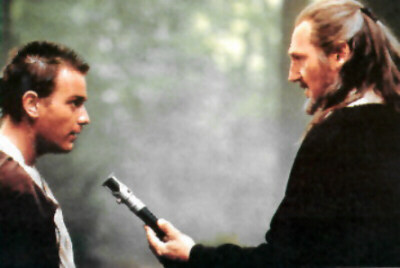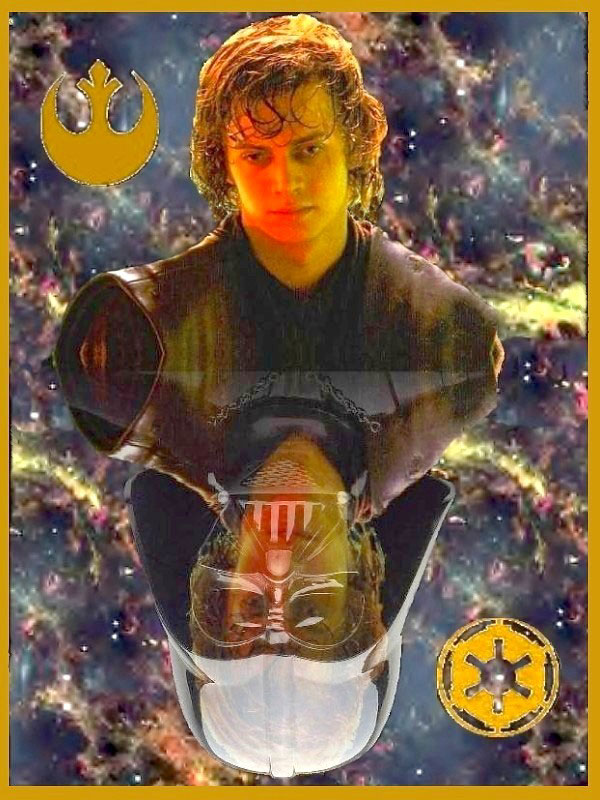Jay Michaelson
 Finally, as ecofeminists like to point out, the external-balance model leads to a lot of violence:
ecological (paving over the Earth, burning it to a crisp - not unlike poor Anakin), political, and personal.
One often hears such injustices justified with a tough attitude of
"that's the way it is." It's easy to imagine this "get tough" rhetoric, since we hear
it all the time: Come on, this is the nature of the best --
we want something, we get it; you want an omelet, you gotta break some
eggs; stop hugging the trees and get a life. And an SUV.
Well, for the broken eggs and burnt trees, that attitude is terrible news. It brings about more suffering, less sustainable living, and environmental catastrophe. Yet, if we remain within a model in which sensitivity is privatized and circumscribed, it's hard to respond to the pavers. Hell, I like air conditioning, driving, and eating meat -- who am I to judge another's ecological choices?
Finally, as ecofeminists like to point out, the external-balance model leads to a lot of violence:
ecological (paving over the Earth, burning it to a crisp - not unlike poor Anakin), political, and personal.
One often hears such injustices justified with a tough attitude of
"that's the way it is." It's easy to imagine this "get tough" rhetoric, since we hear
it all the time: Come on, this is the nature of the best --
we want something, we get it; you want an omelet, you gotta break some
eggs; stop hugging the trees and get a life. And an SUV.
Well, for the broken eggs and burnt trees, that attitude is terrible news. It brings about more suffering, less sustainable living, and environmental catastrophe. Yet, if we remain within a model in which sensitivity is privatized and circumscribed, it's hard to respond to the pavers. Hell, I like air conditioning, driving, and eating meat -- who am I to judge another's ecological choices?
To the extent my spiritual teaching has anything to do with political activism, it is in its capacity to open the heart. I have devoted much of my life to creating the conditions necessary for softening, opening, and increasing in sensitivity the human heart and mind. I have done so because, for me, they bring about increased wonder, increased joy, and increased justice in the world. That last point is the hinge between public and private, between Star Wars' external narrative of fascism and democracy, and its internal narrative of anger and love. I sincerely believe that few of the world's problems will be solved until enough people care -- emotionally, viscerally -- about them. I can make rational arguments for fighting climate change, and ethical arguments about Tibet, but unless you can really, actually care, in your guts, I don't think I'll persuade you. This is why people's lives are changed when they spend time in Israel -- or Palestine, for that matter. Going there, seeing people, feeling joy and sorrow -- these experiences open hearts, and open hearts condition open minds.
In my limited experience, the only ways hearts get opened in this way are tragedy and meditation. If it's true that a conservative is just a liberal who got mugged, then it's also true that a liberal is just a conservative who suffered. And yet, even tragedy isn't enough -- look at what happened to Anakin. He suffered, but learned to live with his suffering (the death of his mother, for example) by toughening up and expressing his anger. So do many people today -- not only the liberal who gets mugged, but also the nation that barely survives genocide, and so turns with ever-renewed pain and anger on other nations that it can, in turn, oppress.
That leaves opening the heart. In the wake of the election, I asked myself not how we lost or how the Right lied -- but how people could legitimately vote for Goerge Bush, and how those people could be convinced otherwise. The fact is, there are coherent ideologies that leave one a happy, well-adjusted Bush supporter. Republicans are not sad, or distorted. But, I think, they are vulnerable to the suffering their actions create. If, somehow, they could actually experience the suffering of a homeless mother, or an innocent Iraqi; if, somehow, they could actually be moved by the felling of a forest -- if, in short, their hearts could bleed just like the liberals' -- then supporting the policies of Bush might be actually painful to them.
None of that transformation is going to happen through argumentation, or confrontation. As in the Empire, there are compelling narratives of safety and security which have people scared stiff, and coherent narratives of salvation which have them believing their particular values. These will continue to do their work, I suspect, and their costs will continue to be seen as, at worst, necessary evils. What's more, an important difference between the world Star Wars and our own is that, in our world, the Palpatines and Anakins rarely suffer themselves. They are not deformed, or burned, or dismembered -- they live comfortably, and insulated from the suffering they create. Afflicting the comfortable is far harder than we might imagine.
Anakin's conscience stirred, early in the movie, when he was asked to execute the helpless Count Dooku. But he did it -- he just grit his teeth, toughened up, and did it, like so many soldiers do every day in battle. That's when Palpatine knew he had found his apprentice: when Anakin showed he could suppress his ability to feel. It wasn't so much a question of conscience -- conservatives have consciences -- as of cruelty; how steeled he was able to become, and how swayed by the rhetorics of anger and fear. Anakin was tough, killing Dooku, wounding Windu, and annihilating a roomful of Jedi children; he became a certain kind of hero.
 Obi-Wan leaves Anakin alive at the end of the film, albeit in unspeakable agony. Maybe Obi-Wan couldn't bring himself to kill his onetime apprentice, whom he loved. But in sparing Vader, Obi-Wan allows for the Force to unfold as prophesied, even though he cannot imagine it. And poignantly, the same faculty that is Anakin's tragic flaw in Sith -- his overabundant love for his family, which blinds him to his own conscience and heart -- redeems him at the end of Jedi, after he has caused twenty five years of death and suffering. He still, somehow, loves.
Obi-Wan leaves Anakin alive at the end of the film, albeit in unspeakable agony. Maybe Obi-Wan couldn't bring himself to kill his onetime apprentice, whom he loved. But in sparing Vader, Obi-Wan allows for the Force to unfold as prophesied, even though he cannot imagine it. And poignantly, the same faculty that is Anakin's tragic flaw in Sith -- his overabundant love for his family, which blinds him to his own conscience and heart -- redeems him at the end of Jedi, after he has caused twenty five years of death and suffering. He still, somehow, loves.
All that time -- and yet Anakin's heart remained alive, even under a case of black steel. It makes me reconsider the exteriors of those who seem not to care, even at the risk of condescension. It asks of me a lot of patience, and trust. And it gives me a certain kind of hope.

A review of Mentsh: On Being Jewish and Queer
May, 2005
May, 2005
April, 2005
March, 2005
On the anthropology of contemplative practice
February, 2005
The last words of Israel's soldier-poet
January, 2005
Jonathan Caouette's art-house smash
November, 2004
Notes from and after retreat
or, The Opposite of Sex
Dick Cheney and the New Age
Frederick Wiseman takes us inside the pervasive, sinister institution of
domestic violence.
February, 2004
August, 2003
March, 2003
What's the difference between laughing with art and laughing at it?
June, 2002
March, 2002



Star Wars, George Bush, Judaism, and the Penis
Jay Michaelson
The So-Called Jewish Cultural Revolution
Leah Koenig
Witnessing Marshall Meyer
Josh Feigelson
We Will Destroy the Museums
Dan Friedman on Ashes and Snow
Clive Firestone
Nicole Taylor
Heart of Pinkness
Michael Kuratin
Archive
Our 670 Back Pages
Zeek in Print
Spring 2005 issue now on sale!
About Zeek
Mailing List
Contact Us
Subscribe
Tech Support
Links
From previous issues:
Zionism and Colonialism
Michael Shurkin
The Other Rally
Samuel Hayim Brody
Giving Thanks to Elijah in Indian Manhattan
Jonathan Schorsch
 Email us your comments
Email us your comments